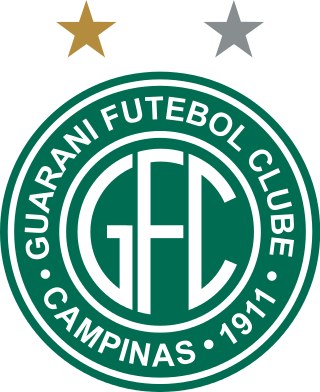
Fortaleza Esporte Clube, usually known as Fortaleza, is primarily a football club, but is active in other sports such as futsal, handball and basketball. Fortaleza Esporte Clube is based in Fortaleza, capital of the State of Ceará, Brazil. The club was founded on October 18, 1918.

Guarani Futebol Clube, colloquially called Guarani, is a Brazilian association football club in Campinas, São Paulo. Guarani is the only club not based in a state capital or coastal city to have won the top tier of the Brazilian Championship. The team currently play in the Série B, the second tier of Brazilian football, as well as in the Campeonato Paulista Série A1, the top tier of the São Paulo state football league.
The Torneio Roberto Gomes Pedrosa, also known as Taça de Prata, or nicknamed Robertão, was an association football competition contested in Brazil between 1967 and 1970 among soccer teams from São Paulo, Rio de Janeiro, Rio Grande do Sul, Minas Gerais and Paraná states. It was an important soccer tournament, being considered a predecessor to the Brazilian Championship induced in 1971. Thus in 2010 the Brazilian Football Confederation decided to consider the winners of the Robertão as Brazilian champions. The 1st edition of the tournament was organized by Federação de Futebol do Estado do Rio de Janeiro and Federação Paulista de Futebol.

America Football Club, usually abbreviated to America-RJ or simply America, is a Brazilian football team based in the city of Rio de Janeiro, in the northern neighborhood of Tijuca. The team compete in Campeonato Carioca, the top tier of the Rio de Janeiro state football league.

América Futebol Clube, commonly referred to as América de Natal, is a Brazilian professional club based in Natal, Rio Grande do Norte founded on 14 July 1915. It competes in the Campeonato Brasileiro Série D, the fourth tier of Brazilian football, as well as in the Campeonato Potiguar, the top flight of the Rio Grande do Norte state football league.

ABC Futebol Clube, commonly referred to as ABC, is a Brazilian professional club based in Natal, Rio Grande do Norte founded on 29 June 1915. It competes in the Campeonato Brasileiro Série C, the third tier of Brazilian football, as well as in the Campeonato Potiguar, the top flight of the Rio Grande do Norte state football league.

The Torneio Rio – São Paulo was a traditional Brazilian football competition contested between São Paulo and Rio de Janeiro teams from 1933 to 1966, in 1993 and from 1997 to 2002.
Copa dos Campeões was a Brazilian football competition, organized by the Brazilian Football Confederation (CBF), contested by the best teams from each one of the regional cups.

Rogério Mücke Ceni is a Brazilian professional football coach and former player who is in charge of Bahia. He is considered one of the all-time greatest Brazilian goalkeepers and is recognised by the International Federation of Football History & Statistics as the goalkeeper to have scored the most goals in the history of football. During the height of his career (2005–2008) he was also recognized as one of the best goalkeepers in the world.

The Campeonato Brasileiro Série A, commonly referred to as the Brasileirão, and also known as Brasileirão Assaí due to sponsorship with Assaí Atacadista, is a Brazilian professional league for men's football clubs. At the top of the Brazilian football league system, it is the country's primary football competition. Contested by 20 clubs, it operates on a system of promotion and relegation with the Campeonato Brasileiro Série B. In 2021, the competition was chosen by the IFFHS as the strongest national league in South America as well as the strongest in the world.

Baré Esporte Clube, usually known simply as Baré, is a Brazilian football club from Boa Vista, Roraima.

Campinense Clube, commonly referred to as Campinense, is a Brazilian professional club based in Campina Grande, Paraíba founded on 12 April 1915. It competes in the Campeonato Brasileiro Série D, the fourth tier of Brazilian football, as well as in the Campeonato Paraibano, the top flight of the Paraíba state football league.
Torneio dos Campeões was an official Brazilian football competition, promoted and organized by CBF in 1982.

Ferroviario Atlético Clube, commonly known as Ferroviário, was a Brazilian football club based in Porto Velho, Rondônia state. They were the most successful team in the Campeonato Rondoniense.

Estrela do Norte Futebol Clube, commonly known as Estrela do Norte, is a Brazilian football club based in Cachoeiro do Itapemirim, Espírito Santo. It competes in Campeonato Capixaba, the Espírito Santo premier state football league.
The Torneio Norte-Nordeste was a football competition held between 1968 and 1970. In 1968 and 1969, it was played exclusively by North Tournament champion and the Northeast Tournament. In 1970, the tournament was played on a quadrangular basis involving four clubs.
The Campeonato Acreano Segunda Divisão, sometimes referred as Campeonato Acriano Segunda Divisão, is the second tier of the football league of the state of Acre, Brazil.
The Torneio do Norte was a football competition held between 1968 and 1971. The champion of the tournament gained a place in the Torneio Norte-Nordeste of the same year.
José Carlos da Silva Lemos, better known as Caio Cambalhota, is a Brazilian former professional footballer who played as a forward.











